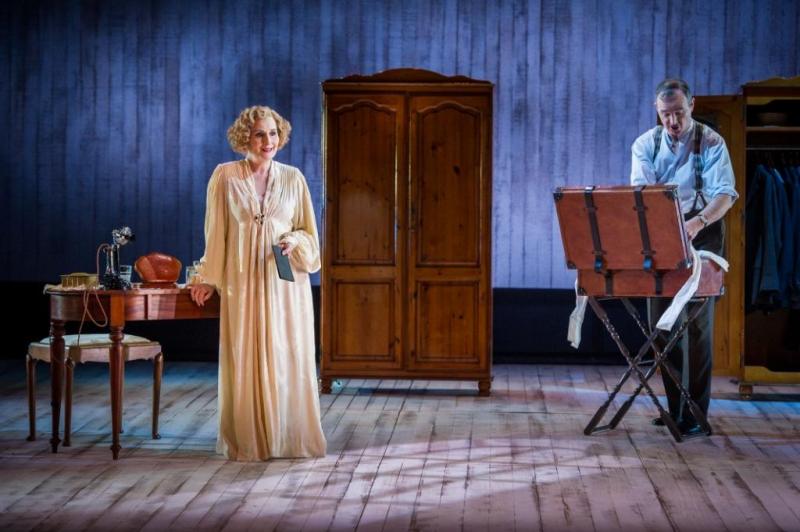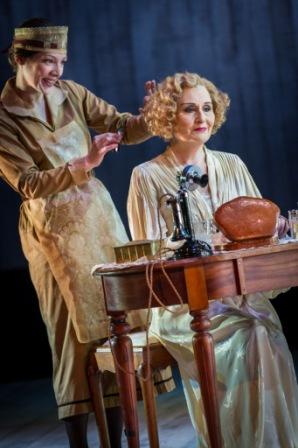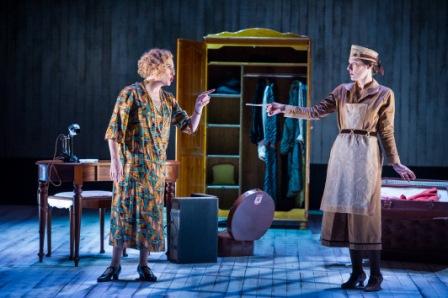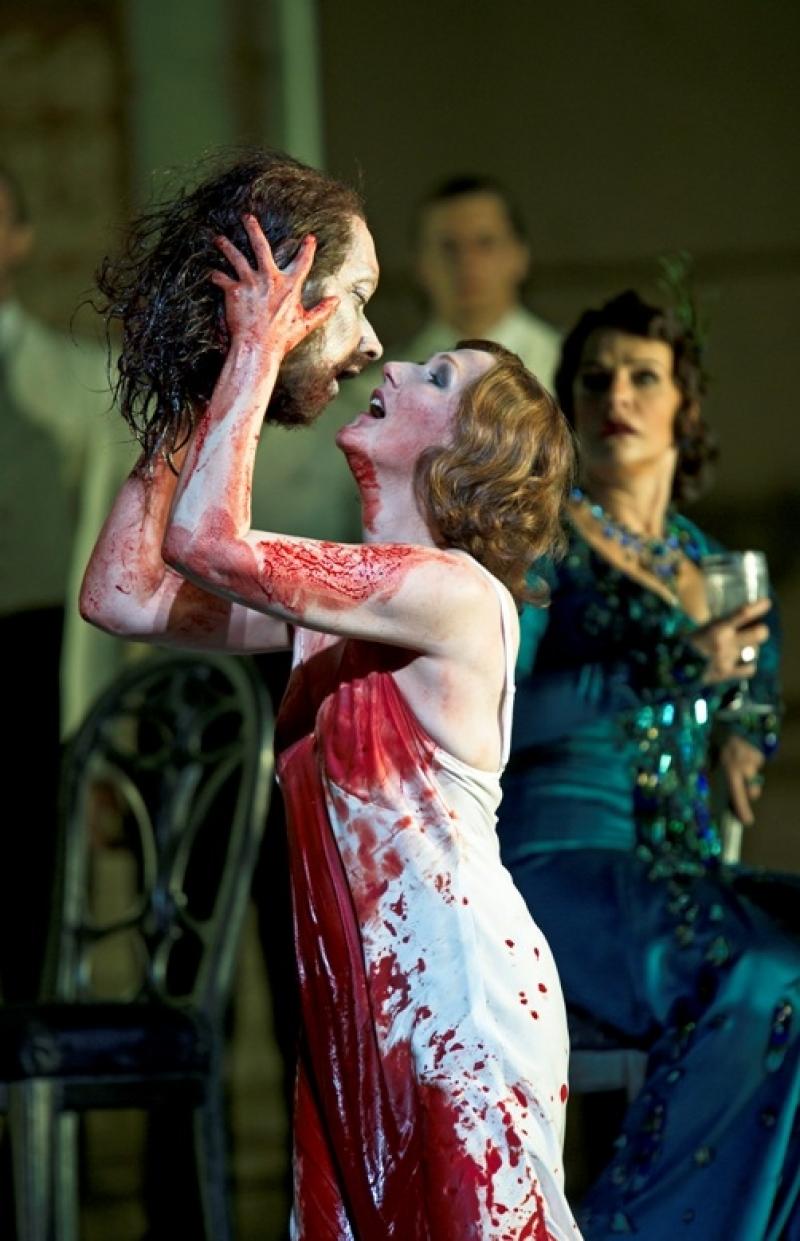Intermezzo, Buxton Festival | reviews, news & interviews
Intermezzo, Buxton Festival
Intermezzo, Buxton Festival
Richard Strauss's comedy-with-feeling kicks off the 34th festival in fine style

No sooner had the Olympic torch been run out of town than in rushed the cavalcade of opera singers, musicians, actors, dancers and literary talkers for the start of the 34th Buxton Festival. Leading them, so to speak, was Stephen Barlow, the new Artistic Director. Nothing daunted, he decided to take up the baton for the opening night.
The tradition here is to surprise us with works from opera’s old curiosity shop. Even if we’ve heard of them, we may well not have seen them, sometimes prompting the ironical “I wonder why?” Not the case with Intermezzo, but we have the double bill of Sibelius’s The Maiden in the Tower and Rimsky-Korsakov’s Kashchei the Immortal lying in wait.
Starting with Intermezzo, Strauss’s autobiographical comedy-with-feeling, neglected for years after its Dresden premiere in 1924 and still not favoured with a London production, has a novelty value certainly. Delightful, tuneful and (melo)dramatic in its re-telling of the temporary domestic dissonance between man and wife, Richard and Pauline, and their happy reconciliation, it got proceedings off to a thoroughly enjoyable start. It was also a finely judged choice for this small glittering Edwardian opera house in the Derbyshire hills, embracing the intimacy of the piece.
Set in Austria in 1902, in the mountain resort of Grundlsee and in Vienna, we see the story played out cinematically in 13 scenes linked by symphonic interludes. After each scene the curtain comes down, like a screen image fading to black, and the wonderfully descriptive mood music comes into its own.
 The domestic situation is temporarily disrupted by Robert Storch (Strauss) going off on a two-month conducting assignment, leaving his sharp-tongued wife Christine (Pauline) to her own devices. She soon meets a young admirer, Baron Lummer, on the slopes and develops a dalliance. All goes well until she opens a letter from a femme fatale to her husband, implying that he’s misbehaving while on tour. The impetuous Christine starts divorce proceedings at once, but is soon assured that the letter was intended for Robert’s colleague Stroh (easily confused with Storch?). The upset is sorted out and the couple resume their marital bliss (rather than blitz). It would be a trivial, if touching, tale, were it not a representation of a significant episode in the Strauss household. It’s really a love story in the end – and Christine, for all her bitchiness and self-pity, is really a pussycat.
The domestic situation is temporarily disrupted by Robert Storch (Strauss) going off on a two-month conducting assignment, leaving his sharp-tongued wife Christine (Pauline) to her own devices. She soon meets a young admirer, Baron Lummer, on the slopes and develops a dalliance. All goes well until she opens a letter from a femme fatale to her husband, implying that he’s misbehaving while on tour. The impetuous Christine starts divorce proceedings at once, but is soon assured that the letter was intended for Robert’s colleague Stroh (easily confused with Storch?). The upset is sorted out and the couple resume their marital bliss (rather than blitz). It would be a trivial, if touching, tale, were it not a representation of a significant episode in the Strauss household. It’s really a love story in the end – and Christine, for all her bitchiness and self-pity, is really a pussycat.
Conducting the Northern Chamber Orchestra, Barlow revelled in the interludes, drawing out those tell-tale Strauss melodies, which reaffirm the storyline. The libretto, written by Strauss himself and sung in English with side titles, reflects the domestic nature of the conversations, delivered in recitative form. That’s what it is – a plain and simple conversation piece and you need to pay attention to the words, some sung, some spoken, to share the humour, the feelings and the irony.
At the centre of it all is Christine, who is hardly off the stage. Janis Kelly is just terrific in the part – querulous, self-serving, bitchy, coquettish, loving. Hers is an all-embracing characterisation and she sings with great clarity. The show is worth seeing for her alone, although she leads a fine cast. Stephen Gadd is a patient husband and Andrew Kennedy makes a nicely duplicitous Lummer (though he looks a tad too mature to be a toy boy). Susanne Holmes as Anna (pictured below, to the right, with Kelly), the no-nonsense maid who puts up with Christine’s sharp tongue, pleases the eye – and the ear.
 Director Stephen Unwin keeps the “play” workmanlike and practical, as befits the “ordinary” life portrayed. The staging is minimalist - essentially just a few sticks of furniture on a bare stage. At least this facilitates the swift scene changes, from domestic dining room to tobogganing to a Viennese ball and the rest. The downside is that this gets a little repetitive and there is no atmosphere. But, in the end, the atmosphere comes from the music, made to accompany a silent movie. Richard Strauss, the man and the composer, carries the day.
Director Stephen Unwin keeps the “play” workmanlike and practical, as befits the “ordinary” life portrayed. The staging is minimalist - essentially just a few sticks of furniture on a bare stage. At least this facilitates the swift scene changes, from domestic dining room to tobogganing to a Viennese ball and the rest. The downside is that this gets a little repetitive and there is no atmosphere. But, in the end, the atmosphere comes from the music, made to accompany a silent movie. Richard Strauss, the man and the composer, carries the day.
This performance was dedicated to the memory of Malcolm Fraser, the young man who had the unlikely idea and imagination to start the Festival in 1979, who died earlier this year.
MORE RICHARD STRAUSS ON THEARTSDESK
Der Rosenkavalier, Royal Opera (2009). Uneven revival of John Schlesinger’s 25-year-old production
Capriccio, Grange Park Opera (2010). Lively staging, stylish singing and a welcome intrusion of wartime reality
Salome, Royal Opera (2010). Angela Denoke's mercurial Salome (pictured below by Clive Barda) shimmers in Strauss's monstrously beautiful opera
Ariadne auf Naxos, Welsh National Opera (2010). Hoffmansthal's libretto is all about fidelity. This updating is faithful, up to a point
 Intermezzo, Scottish Opera (2011). Soprano Anita Bader graces a Klimtian take on Richard Strauss's domestic comedy
Intermezzo, Scottish Opera (2011). Soprano Anita Bader graces a Klimtian take on Richard Strauss's domestic comedy
Die Frau ohne Schatten, Mariinsky Opera (2011). Strauss's massive fairy tale makes a rare outing in Gergiev’s musically strong venture at the Edinburgh Festival
Der Rosenkavalier, English National Opera (2012). David McVicar and Edward Gardner deliver a riveting account of Strauss's popular opera with Amanda Roocroft as the Marschallin
Ariadne auf Naxos, Glyndebourne Festival Opera (2013). Strauss's opera reluctantly enters the Battle of Britain courtesy of a young German director
Capriccio, Royal Opera (2013). Renée Fleming leads superlative cast in concert performance of Strauss's operatic debate
Elektra, Royal Opera (2013). Revival with Christine Goerke in the title role hits the horrid heart of the matter in Strauss's poleaxing masterpiece
Die Frau ohne Schatten, Royal Opera (2014). Compelling dream-interpretation of Strauss's myth graced by fine singing and Semyon Bychkov’s conducting
Der Rosenkavalier, Glyndebourne (2014). Richard Jones finds new order in rococo comedy for music, with Kate Royal as the Marschallin
Salome, BBC Proms (2014). Nina Stemme stuns with Donald Runnicles and the Deutsche Oper Berlin in a giddying account of Strauss's incredible score at the Proms
Ariadne auf Naxos, Royal Opera (2014). Two nymphs are the real revelation in this revival of evergreen hybrid
Salome, Symphony Hall, Birmingham (2015). Lise Lindstrom steals the show from Karabits and Bournemouth SO as a sensual Strauss anti-heroine in concert
Der Rosenkavalier, Royal Opera (2016). Robert Carsen's handsome production with Renée Fleming is elevated by superb orchestral playing
The future of Arts Journalism
You can stop theartsdesk.com closing!
We urgently need financing to survive. Our fundraising drive has thus far raised £49,000 but we need to reach £100,000 or we will be forced to close. Please contribute here: https://gofund.me/c3f6033d
And if you can forward this information to anyone who might assist, we’d be grateful.

Subscribe to theartsdesk.com
Thank you for continuing to read our work on theartsdesk.com. For unlimited access to every article in its entirety, including our archive of more than 15,000 pieces, we're asking for £5 per month or £40 per year. We feel it's a very good deal, and hope you do too.
To take a subscription now simply click here.
And if you're looking for that extra gift for a friend or family member, why not treat them to a theartsdesk.com gift subscription?
more Opera
 Madama Butterfly, Irish National Opera review - visual and vocal wings, earthbound soul
Celine Byrne sings gorgeously but doesn’t round out a great operatic character study
Madama Butterfly, Irish National Opera review - visual and vocal wings, earthbound soul
Celine Byrne sings gorgeously but doesn’t round out a great operatic character study
 theartsdesk at Wexford Festival Opera 2025 - two strong productions, mostly fine casting, and a star is born
Four operas and an outstanding lunchtime recital in two days
theartsdesk at Wexford Festival Opera 2025 - two strong productions, mostly fine casting, and a star is born
Four operas and an outstanding lunchtime recital in two days
 The Railway Children, Glyndebourne review - right train, wrong station
Talent-loaded Mark-Anthony Turnage opera excursion heads down a mistaken track
The Railway Children, Glyndebourne review - right train, wrong station
Talent-loaded Mark-Anthony Turnage opera excursion heads down a mistaken track
 La bohème, Opera North review - still young at 32
Love and separation, ecstasy and heartbreak, in masterfully updated Puccini
La bohème, Opera North review - still young at 32
Love and separation, ecstasy and heartbreak, in masterfully updated Puccini
 Albert Herring, English National Opera review - a great comedy with depths fully realised
Britten’s delight was never made for the Coliseum, but it works on its first outing there
Albert Herring, English National Opera review - a great comedy with depths fully realised
Britten’s delight was never made for the Coliseum, but it works on its first outing there
 Carmen, English National Opera review - not quite dangerous
Hopes for Niamh O’Sullivan only partly fulfilled, though much good singing throughout
Carmen, English National Opera review - not quite dangerous
Hopes for Niamh O’Sullivan only partly fulfilled, though much good singing throughout
 Giustino, Linbury Theatre review - a stylish account of a slight opera
Gods, mortals and monsters do battle in Handel's charming drama
Giustino, Linbury Theatre review - a stylish account of a slight opera
Gods, mortals and monsters do battle in Handel's charming drama
 Susanna, Opera North review - hybrid staging of a Handel oratorio
Dance and signing complement outstanding singing in a story of virtue rewarded
Susanna, Opera North review - hybrid staging of a Handel oratorio
Dance and signing complement outstanding singing in a story of virtue rewarded
 Ariodante, Opéra Garnier, Paris review - a blast of Baroque beauty
A near-perfect night at the opera
Ariodante, Opéra Garnier, Paris review - a blast of Baroque beauty
A near-perfect night at the opera
 Cinderella/La Cenerentola, English National Opera review - the truth behind the tinsel
Appealing performances cut through hyperactive stagecraft
Cinderella/La Cenerentola, English National Opera review - the truth behind the tinsel
Appealing performances cut through hyperactive stagecraft
 Tosca, Royal Opera review - Ailyn Pérez steps in as the most vivid of divas
Jakub Hrůša’s multicoloured Puccini last night found a soprano to match
Tosca, Royal Opera review - Ailyn Pérez steps in as the most vivid of divas
Jakub Hrůša’s multicoloured Puccini last night found a soprano to match
 Tosca, Welsh National Opera review - a great company reduced to brilliance
The old warhorse made special by the basics
Tosca, Welsh National Opera review - a great company reduced to brilliance
The old warhorse made special by the basics

Add comment